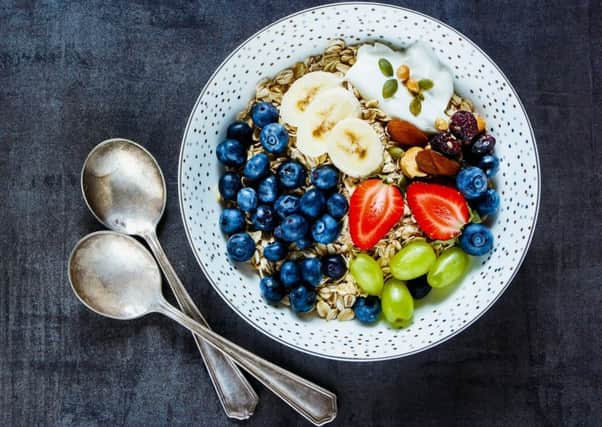Donna Peters column: How to put the brakes on the ageing process


Our genes play a part in how we age; the rest is down to our lifestyle, so the choices we make regarding what we eat, the amount of exercise we do and how we manage stress all have an effect on our individual ageing process.
With regards to nutrition, it’s really important to include antioxidants in our diet. Antioxidants are substances that help protect the body against damage from free radicals. Free radicals can cause oxidative damage to cells and tissues, resulting in age-related diseases and symptoms of ageing such as developing wrinkles, declining vision, poor digestion, fatigue, a decrease in cognitive function and so on.
Advertisement
Hide AdAdvertisement
Hide AdThe following vitamins and minerals have antioxidant properties:
l Vitamins – A, C and E
l Minerals – Zinc, manganese, copper, selenium
Good sources of antioxidants include broccoli, carrots, peppers, apricots, whole grains, nuts and seeds.
However, antioxidants are only half the story. B vitamins control a process in the body called methylation, which protects DNA and allows healthy new cells to develop. You can check how well your methylation processes are working by measuring your homocysteine (an amino acid) levels, as high levels indicate a higher risk for degenerative diseases. Changes to diet and ensuring the right intake of B vitamins can help to reduce your homocysteine levels.
Regular exercise can add an average of 7 years to your lifespan. Ideally, incorporate a combination of regular gentle stretching exercise, such as Pilates or yoga, along with aerobic activity such as brisk walking, swimming or playing tennis, into your daily routine. The benefits of aerobic exercise include reducing blood cholesterol levels, pulse rate and blood pressure, which all support improved cardiovascular health. Resistance training is good for bone health, so also try to include three to four sessions every week.
Advertisement
Hide AdAdvertisement
Hide AdIt’s important to avoid or reduce stress as much as possible as prolonged periods of stress can result in the depletion of the adrenal hormone DHEA. Low levels of DHEA are associated with a higher risk of developing many diseases and speeds up the ageing process in general.
Top tips to turn back the clock …
1 Eat a low-glycemic, anti-ageing diet that includes antioxidant-rich fruits and vegetables, good quality protein, essential omega 3 and 6 fatty acids, whole grains, root vegetables, lentils and beans.
2 Keep well hydrated with water
3 Limit alcohol, sugar, caffeine, additives, processed foods and salt
4 Consider taking a good quality multi-vitamin and mineral supplement
5 Exercise regularly
6 Manage stress levels
7 Limit exposure to avoidable sources of free radicals (fried/browned food, exhaust fumes, smoke, strong sunlight).